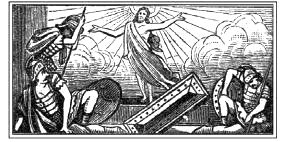
| Contents | Tempus Adventus Advent |
Home |

The word Advent comes from the Latin words, advenire (to come to) & adventus (an arrival), and refers to Christ's coming into this world. The Advent season is a time of joyful expectation and preparation for Christmas, the day upon which Christ's birth is celebrated and His first coming into this world. The focus of Advent is upon the centuries of waiting and preparation by God's chosen people which preceded the coming of the Messiah. As such, it is a time marked by expectation, hope, preparedness and penance. The later being mindful of John the Baptist's cry to prepare for the coming of the Lord with repentance. ( Matt. 3:3, 11:10; Mark 1:2-3; Luke 1:17, 1:76, 3:4). Also, while Advent is the season before Christmas, the focus of Advent is by no means limited to just Christ's first coming. An equal, if not more important, theme found in the Advent Liturgy is the Second Coming of Christ when He comes again to judge the world. The Advent Liturgy looks to both the past and future. In the past Christ came amongst us as one of our own. He was born of a woman into this world and of humble means. In the future He will come again, not as a defenseless infant, but as the Judge of all the living and the dead. Thus the Liturgy looks back over thousands of years to when the human race waited for its Redeemer and then to the future when this world will end and He will come then as our Judge. This dual theme, the first and second coming, is easily observed in the hymns for Advent given below. Also, while it is not part if the Advent Liturgy today, it is useful to note that Dies Irae was originally not a hymn associated with death and burial, but a hymn that was composed as a sequence for the first Sunday in Advent. Its sober tone was designed to remind us of both Christ's first coming and His Second Coming at the end of the world. Lastly, it should be mentioned that long standing traditions hold that there are four comings of Christ. The first two of these have already been mentioned. His first coming was when He came to us in the flesh. His Second Coming is when He will come at the end of world to judge the living and the dead. However, between these two are two more; Christ's coming into our hearts, and Christ's coming to us at our death. While the Advent Liturgy explicitly stresses the first two, by implication the later two are present as well. It is difficult to pinpoint in time exactly when Advent was first celebrated by the Church. Advent itself is the season prior to Christmas and is thus intimately acquainted with the celebration of Christ's birth. Since the celebration of Christ's birth has evolved over time, so too has the season of Advent. The earliest documentation we have on the season comes to us from the fourth century and the earliest Advent hymns we have come from roughly that period as well (Prudentius). It is thus clear that at least the roots of the Advent season go back to sometime around the later part of the fourth century. By the late sixth century the season is well established, at least in the Latin West. St. Caesarius, Bishop of Arles (502-542) mentions a time of preparation before the celebration of Christ's birth in his homilies. A sermon given by Pope St. Gregory the Great on the Second Sunday of Advent has come down to us as well. Advent was evidentially a western tradition before it became an eastern tradition. It is not until the eighth century that we have the first record of the season being celebrated in the East. Today Advent signals the beginning of the Church year and begins on the Sunday closest to the Feast of St. Andrew the Apostle (November 30). This Sunday is the fourth Sunday before Christmas and falls between November 27 and December 3. The Advent season will thus have between 21 and 28 days, depending upon where this Sunday falls. Some articles from the Catholic Encyclopedia related to Advent: Advent |
- Litaniae ad Christum ex Scriptura Sacra in Adventu
Litany to Christ from Sacred Scripture for Advent
- Hymni (Hymns)
- Angelus ad Virginem
Gabriel, from Heaven's King- Ante Diem 16 Decembris
- Ad Vesperas
- Conditor Alme Siderum
Creator of the Stars of Night- Creator alme siderum
Bright Builder of the Heavenly Poles- Ad Officium lectionis (Readings /Matins)
- Verbum supernum prodiens
Celestial Word, to This Our Earth- Ad Laudes matutinas (Lauds)
- Vox clara intonat
A Thrilling Voice by Jordan Rings- En clara vox redarguit
- Post Diem 16 Decembris
- Ad Officium lectionis (Readings/ Matins)
- Veni, redemptor gentium
O Come, Redeemer of the Earth- Veni, Veni Emmanuel
O come, o come, Emmanuel- Stabat Mater Speciosa
- Officia Parva (Little Offices)
- Officium parvum Conceptionis Immaculatae
Little Office of the Immaculate Conception
<- Prev |
Next-> |
